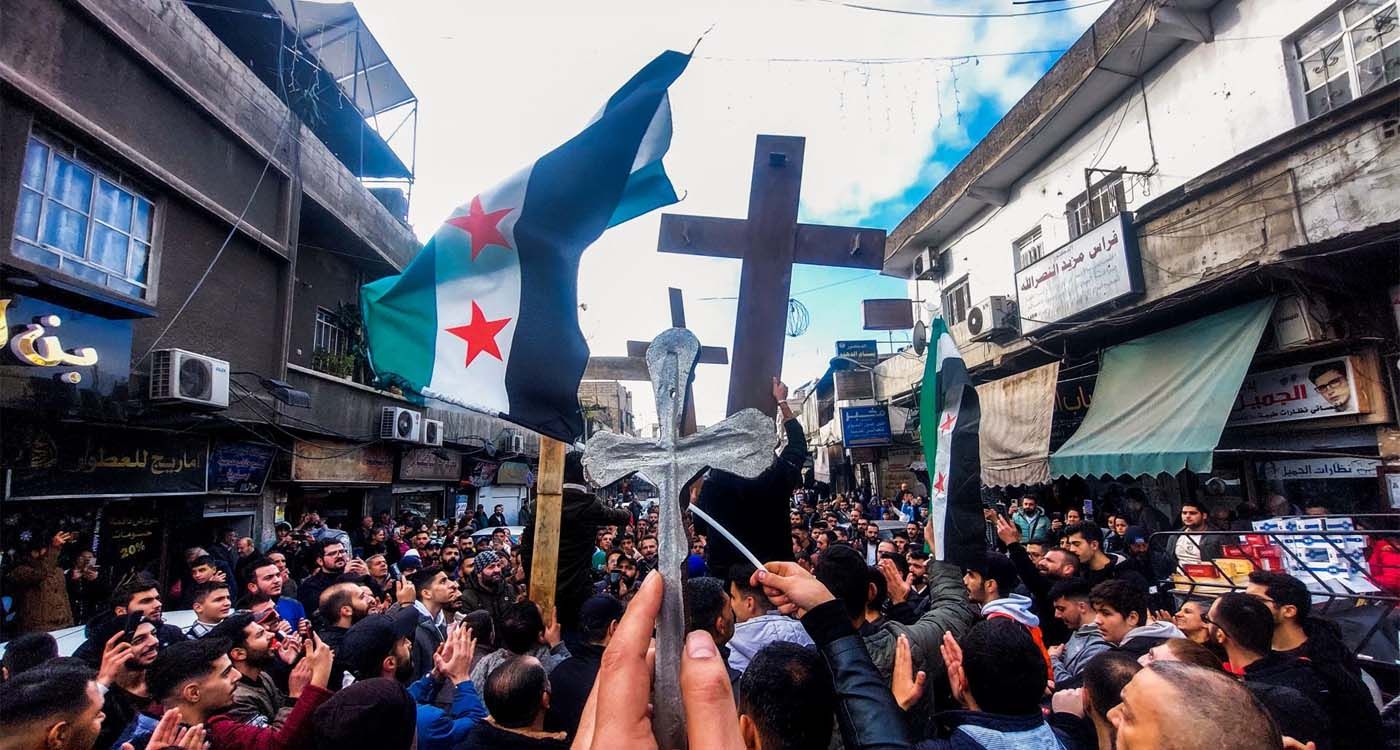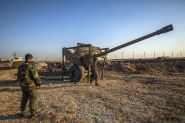- Home
- Middle East
- Syria’s Christians in the New Order: A Fight for Survival

©AFP
The suicide bombing that struck Saint Elias Greek Orthodox Church on Sunday, June 22, in Damascus’s Dwelaa district has reignited deep fears among Syria’s Christian community – already alarmed by the growing influence of Islamist groups in the country.
The attack, claimed by the “Saraya Ansar al-Sunna” group, killed at least 22 worshippers and injured 63 others, according to Syrian authorities.
The day after the bombing, officials announced the arrest of six individuals linked to the attack. Two others, also allegedly involved, were killed, bringing the total number of identified perpetrators to eight.
President Ahmad al-Chareh condemned the assault as a “heinous” crime and pledged to bring both the attackers and their instigators to justice. Interior Minister Anas Khattab added that “these terrorist acts will not derail the Syrian state’s efforts to achieve civil peace.”
Still, such assurances have done little to dispel the anxiety gripping many Christians in Syria.
Just two weeks earlier, on June 8, the cross atop the Syriac Orthodox Cathedral of Saint Mary in Homs was riddled with bullets. That attack was attributed to another jihadist group operating in the region. Other, smaller acts of intimidation, less violent but deeply unsettling, have also been reported in Christian neighborhoods.
Together, these incidents point to a broader trend: a society under pressure, where Islamist factions are gaining ground, targeting both the newly restructured regime and religious minorities alike.
A Lingering Fear and Diverging Interpretations
In the wake of the bombing, fear is spreading across Syria’s Christian community, accompanied by varying interpretations of its meaning.
Speaking to This is Beirut under condition of anonymity, a Damascus-based prelate believes the attack was primarily aimed at “discrediting the new regime, which has been reaching out to Christians.”
Since assuming power in December 2024 after the ousting of President Bashar al-Assad, Syria’s new leader Ahmad al-Chareh has made numerous gestures of inclusion toward minorities, particularly Christians, clearly aiming to reassure them. This political approach has been met with intolerance by hardline Islamists within Syria.
The same prelate adds that by specifically targeting the Greek Orthodox community, the attackers may also have sought to send a message of retaliation against Russia. He interprets Sunday’s bombing as “a message to Moscow, accused of committing massacres against Muslims during its 2011 intervention in support of Assad.”
He notes that Russia has long been viewed as “the traditional protector of Greek Orthodox Christians since the 19th century.” Ultimately, he warns that these acts aim “to entrench an Islam rooted in radicalism and terror.”
While not subject to outright persecution, Syria’s Christians are living in a climate of unease, says Archbishop Jacques Mourad, the Syriac Catholic Archbishop of Homs, in an interview with the official news outlet of the Priestly Fraternity of Saint Pius X (FSSPX).
He notes that church services and religious processions continue freely, and that the new government has made numerous conciliatory gestures toward minorities. Still, he points out that conditions widely vary from one region to another, and that no one is eager to risk provoking the wrath of the new authorities.
A Society in Transition Amid Increasing Religious Constraints
Syria is undergoing significant political restructuring, with a provisional government seeking to assert control over the entire country and curb the influence of fundamentalist groups. However, many Syrians view recent official measures as signaling a gradual move toward stricter religious regulation of public life, especially in mixed social settings. This shift sharply clashes with the customs and lifestyles of many social and community groups and fuels growing anxiety among minority populations.
One notable example is a decree issued by the Ministry of Tourism on June 9, 2025, which requires visitors to public beaches to dress “in accordance with public decency standards.” The decree recommends that women wear burkinis and men wear t-shirts when out of the water.
In response to criticism, Deputy Minister of Tourism Ghaith al-Farrah sought to ease concerns, explaining that “the word ‘forbidden’ does not appear anywhere in the decree; this is not a ban on Western-style swimwear.” He emphasized the government’s aim to respect Syria’s religious and social diversity, noting that the burkini, which had previously been banned in some places, is now permitted.
Caution in Public Spaces
Despite official reassurances, Syria’s Christian community remains deeply uneasy. “People have grown more reserved. They take greater precautions in all aspects of social life. There is more concern, more hesitation, especially in public spaces,” confides a Christian Syrian who spoke to This is Beirut on condition of anonymity.
Hanna, a Christian journalist based in Damascus, tells This is Beirut that “fear has always existed in Syria, but it has sharply intensified in recent months.”
He points to a demographic shift in certain Christian neighborhoods, such as Dwelaa, Tabbaleh and Bab Touma, toward a more conservative and radical population. Yet Hanna notes that “about half of Syria’s Christians have left the country since 2011.” Islamist factions have filled the void in these areas.
Signs of creeping Islamization abound, warns Hanna: “The sudden closure of a hotel selling alcohol, pressure during religious events, arrests of people for wearing shorts, destruction of alcohol bottles at the airport…”
“Under Assad, there were compromises, fines allowed such establishments to operate. Today, our concerns are growing.” He stresses that “the Islamist threat affects not only minorities but all Syrians.” Although he does not regret the former regime, he observes a growing atmosphere of fear, notably marked by the increasing presence of bearded men in the streets. These men often wear headbands inscribed with Islamist slogans.
Hanna criticizes the authorities’ lax approach, arguing that “treating these incidents as isolated has contributed to the current situation.”
However, another Syrian journalist says that in some Damascus neighborhoods, people still freely drink alcohol in bars.
He adds that attacks on Christians “cannot be compared to those targeting Alawites or Druze, which occur in a specific political context.” For reference, clashes in March between government forces and Alawite groups loyal to Bashar al-Assad resulted in over 1,700 deaths, mostly Alawites, according to the Syrian Observatory for Human Rights (SOHR). In April, further fighting erupted between loyalist forces and Druze groups in Jaramana, Sahnaya and Sweida.
While Syria’s provisional constitution officially guarantees the rights of women and minorities, the reality on the ground remains ambiguous and sometimes troubling. Some denounce rising insecurity and covert Islamization, while others emphasize the absence of deliberate political intent to harm Christians.
In this transitioning Syria, Christians cautiously proceed, navigating their fears, resilience and tempered hope amid the uncertainties of a country marked by deep communal and ethnic divides.
Read more




Comments